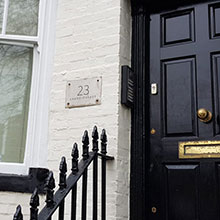
Growing Greener: Building & Maintaining Sustainability Credentials for Your Business
Ever wondered how to make your business more sustainable? Green business practices aren’t just about taking the moral high ground, it’s about adopting and embracing new sustainable practices to reduce waste, contribute lower carbon emissions and prove your environmental awareness in a landscape of consumer attitudes that are increasingly conscious of choosing brands that can prove their environmental footprint is lower than the competition.
Business sustainability should be at the heart of what you do, no matter the sector you’re operating within, because making a positive impact doesn’t just tick the environmental and social responsibility box, it can ultimately help you reduce waste, save energy and save money too.
Why Go Green in the UK Now?
The climate crisis is no longer a distant worry—it’s here and impacting small businesses in every corner of Britain. From air pollution in city centres to plastic choking our oceans, navigating a more sustainable future is both an environmental necessity and a golden opportunity. The UK has committed to net zero emissions by 2050, and every SME can play its part alongside government targets.
By adopting a green growth strategy that reduces your carbon footprint and drives energy savings, you’ll not only help tackle climate change but also unlock long-term cost savings, stronger brand reputation and healthier, more motivated teams—particularly when trying to foster a positive dynamic within your organisation and encourage staff to buy into company values and ethos.

What Are “Green Credentials” for a Small Business?
Put simply, your green credentials are the proof points that show how seriously you take environmental stewardship. Whether your core offering is inherently “green” or not, you can still:
- Cut greenhouse gas emissions through energy efficiency, reducing energy wastage and making use of renewable energy.
- Source sustainable materials from sustainable suppliers, practise ethical supply-chain management and design eco-friendly packaging to pull on fewer resources.
- Be transparent about your environmental impact, publishing mini-audits or metrics on your website and updating clients and customers about your environmental practices and why they’re important to you.
These steps amount to more than a tick-box exercise—they’re a way to weave sustainability practices and social and environmental impact into every aspect of your business operations.
The Business Case for Building Green Credentials
1. Financial Savings
Focusing on sustainable practices shouldn’t just be about the bottom line, but saving money certainly helps when justifying working towards your sustainability goals. Investing in energy efficient lighting, double or triple glazing and low-flow water fixtures can slash your energy consumption and water bills, assuming you have your own premises you can adapt. A simple switch to LED bulbs and turning appliances off at the wall could cut costs by up to 20%—money that can be reinvested in team perks or professional development.
Of course if you operate out of a shared workspace or serviced office then it pays to consider providers that are themselves conscious of positive sustainability initiatives. The more businesses that choose to work with space providers that share their green goals, the more providers will take their responsibilities to the environment and their local communities seriously and adapt to the market.
2. Attracting Talent
Studies show that employees at sustainable businesses report higher motivation and lower absence rates. Today’s workforce—especially graduates and young professionals—often prioritises purpose-driven employers and can even be willing to take a pay cut for roles aligned with their values. That doesn’t give you the green light to offer lower wages than your competitors, but it can give you an edge when it comes to recruitment, that doesn’t require higher outgoings.
3. Appealing to Customers
Over a third of UK consumers will pay a premium for sustainable business practices, and nearly half say a company’s environmental reputation is a key factor in their purchasing decisions. Being able to articulate your green journey—whether it’s as simple as switching to recycled paper, through to installing solar panels or offsetting your carbon emissions via reforestation—builds trust and loyalty.
What’s more, it gives your business achievements to be proud of and publicise accordingly.

4. Attracting Investors & Contracts
Investors increasingly back companies with clear ESG disclosures. And if you ever bid for public-sector contracts or partner with larger firms, robust green credentials can be a decisive competitive advantage. Take a look at our post on attracting investment for your UK small business to learn more about avenues for capital injections.
5. Compliance & Risk Management
With new regulations like the UK’s Extended Producer Responsibility coming into force, early adopters of environmentally friendly practices stay ahead of costly compliance headaches. After all being proactive is almost always more cost effective than scrabbling to catch up in a reactive fashion once your hand is forced. A stitch in time saves nine!
6. Future-Proofing and Resilience
Reducing reliance on fossil fuels and embracing renewable energy sources can make your business more resilient to price shocks and climate-driven disruptions—like flooding or supply-chain delays. Now granted, many small businesses have limited control over where to source their energy short of switching energy supplier but you can still make impactful decisions even if just for your day to day office energy requirements. Pick an energy supplier or tariff that only supplies green energy and this becomes yet another small but meaningful change to incorporate sustainability into your every day.
Practical Steps to Sustainability for UK SMEs
Getting started needn’t be overwhelming. Here are three focus areas to kick off your green transformation:
- Energy & Water Efficiency
- Upgrade to A+ energy-rated appliances, switch to LED lighting and seal drafts for improving energy efficiency.
- Turn off devices completely (not just standby), and consider smart plugs or timers.
- If possible, install low-flow or self closing taps, fix leaks promptly and explore rainwater harvesting for gardening or cleaning.
- Waste Reduction & Recycling
- Digitise documents to cut paper waste—and when you do print (using your energy efficient printer), use recycled paper.
- Set up clear recycling bins at dedicated stations for paper, plastic, glass, tins and cans, and compost any food waste. Don’t forget that all UK businesses have a requirement to separate waste for collection as of March 2025, whether in an office, warehouse, studio, factory, cafe, hotel, shop etc. – Don’t neglect your responsibilities.
- Encourage the use of reusable cups and cutlery; even branded reusable mugs, metal water bottles or thermal coffee cups can showcase your green thinking.
- Sustainable Sourcing & Supply Chain
- Audit suppliers for ethical sourcing, local products or sustainable materials (e.g., FSC-certified wood or eco-friendly textiles).
- Ask partners to share their own carbon emissions targets—collaboration can amplify impact.
- Where feasible, replace fossil-fuel transport with electric vehicles or consolidate deliveries to reduce carbon dioxide emissions. If you have a fleet of company vehicles it may be time to explore updating to fully electric vehicles and enjoying the tax benefits that come with it.

Strategic Foundations: Goals, Metrics & Transparency
- Audit First: Conduct a quick carbon footprint assessment and waste audit to identify hotspots. You don’t need an outside contractor or in-house chief sustainability officer for this. Just make a checklist of areas to assess and measure where improvements could be made
- Set SMART Targets: Whether it’s reducing energy usage by 15% in 12 months or achieving net zero emissions by 2035, measurable goals keep you on track. What are SMART goals? We’ve got a post that goes into more detail on making goals SMART.
- Embed & Communicate: Integrate sustainability initiatives into your regular reporting and your website’s “About Us” page—avoid greenwashing by backing every claim with verifiable data or third-party validation (e.g., B Corp, Carbon Trust Standard or the ASA’s Green Claims Code).
- Collaborate: Partner with bodies like the Carbon Trust, WRAP or local enterprise hubs such as those listed on Brighton & Hove City Council’s sustainable business portal for guidance, grants or renewable energy subsidies and other initiatives.
Overcoming Common Challenges
- Lack of guidance? Tap into resources from the British Business Bank or your local Growth Hub, such as Coast to Capital.
- Supplier claims can be misleading—verify credentials and seek multiple quotes. If you can’t verify a partner’s claims, be wary of taking them at face value.
- Budget constraints? Start small: energy audits and simple lighting upgrades often pay for themselves in under a year.
Where to Find Support
UK SMEs have a wealth of help at their fingertips:
- Grants & Tax Incentives: Explore the Gov.uk Finance and Support Finder for Climate Change Levy exemptions or Capital Allowances on energy-saving equipment.
- Practical Toolkits: WRAP’s waste-reduction guides, Energy Saving Trust’s business audits, and the Green Economy Coalition’s affordable green business ideas.
- Certifications & Networks: B Corp UK, the Sustainable Business Network, or the FSB’s Net Zero Hub.
The Future Is Green—and Collaborative
Green growth isn’t a one-off project—it’s a journey. By taking these steps, your UK SME can play its part in slashing greenhouse gas emissions, cut costs and position itself as a leader in sustainable business practices.
Ready to explore more insights on building and running a thriving small business in an evolving landscape? Dive into our JetSpace blog for tips on everything from scaling your team to mastering local marketing. And if you’re looking for the perfect serviced office space in Brighton or Shoreham to power your green ambitions, get in touch with our team today—let’s grow greener, together.
Call on 01273 917977 or complete our enquiry form
enquire book a viewing

